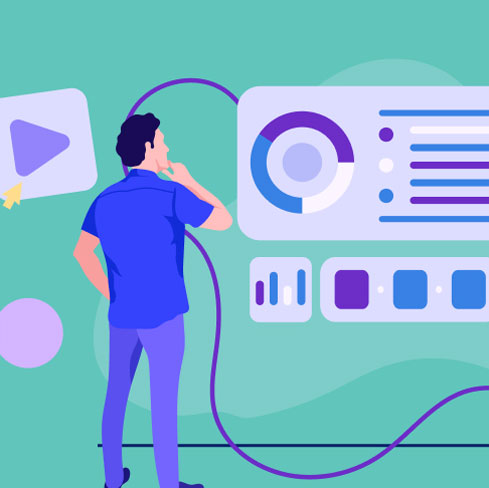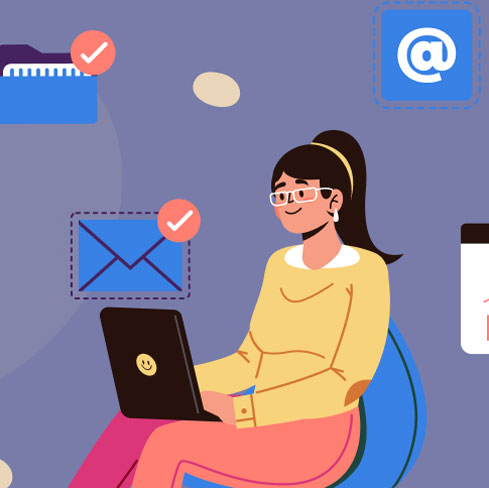Digital Information: A Trap or a Treasure
June 14, 2023 | Read Time : 3 mins
Table of Contents
Introduction
In an era of rapid technological advancements and unprecedented access to information, the digital landscape has become a double-edged sword. On the one hand, it presents us with a seemingly limitless treasure trove of knowledge and opportunities. Conversely, it can trap us in information overload, misinformation, and privacy concerns. The question arises: is digital information a trap that overwhelms us or a treasure with infinite value? In this blog, we delve into the multifaceted nature of digital information, exploring its potential benefits and drawbacks. By examining the challenges it poses and the opportunities it unlocks, we aim to shed light on how we can navigate this digital realm and extract its true worth.

The dark side of digital information
- Information Overload: With overwhelming online information, individuals often find themselves drowning in a sea of data. This can lead to decision paralysis and reduced productivity.
- Misinformation and Fake News: The digital era has also brought about a proliferation of misinformation, making it challenging to discern reliable sources from false ones. This can harm society, from public health to political discourse.
- Privacy Concerns: As we embrace digital information, we must also grapple with data privacy and security concerns. Cyberattacks and breaches pose risks to both individuals and organizations, raising questions about the trustworthiness of the digital realm.
Unleashing the potential: The treasure of digital information
- Empowering Knowledge: Digital information provides unparalleled access to knowledge. Online learning platforms, educational resources, and vast information repositories allow individuals to enhance their skills and broaden their horizons.
- Data-Driven Insights: The abundance of digital data offers organizations valuable insights into consumer behavior, market trends, and operational efficiency. By harnessing the power of analytics and data science, companies can make informed decisions, drive innovation, and gain a competitive edge.
- Collaboration and Connectivity: Digital information facilitates global connectivity and collaboration. It enables people worldwide to share ideas, collaborate on projects, and work remotely. This opens up new possibilities for innovation and problem-solving.
Navigating the digital landscape: Striking a balance
- Information Literacy: Individuals must develop strong information literacy skills to avoid falling into the trap of digital information. This includes critically evaluating sources, fact-checking information, and discerning reliable information from misinformation.
- Prioritization and Focus: In a world of constant distractions, individuals and organizations must learn to prioritize and focus on the most relevant and meaningful information. Setting clear goals, managing time effectively, and employing filters and tools can help navigate the digital landscape.
- Ethical Considerations: Ethical considerations must remain at the forefront as we embrace digital information. This includes respecting privacy, protecting personal data, and ensuring fair and unbiased use of information.
The role of AI in managing digital information
- Automated Data Processing: Artificial intelligence (AI) technologies can help process and analyze large volumes of digital information efficiently. From natural language processing to machine learning algorithms, AI can extract insights, detect patterns, and uncover valuable knowledge from vast data sets.
- Intelligent Search and Recommendation Systems: AI-powered search engines and recommendation systems can help individuals navigate much digital information. These systems use algorithms to understand user preferences and provide personalized and relevant content, saving time and effort.
- Data Security and Privacy: AI can enhance data security and privacy. Machine learning algorithms can identify and flag potential security threats, detect anomalies in data access patterns, and protect sensitive information from unauthorized access or misuse.
The impact of digital information on society and workforce
- Changing Nature of Work: The advent of digital information has transformed how we work. Remote work, digital collaboration tools, and the gig economy have become increasingly prevalent, offering flexibility and new opportunities. However, it also poses challenges, such as job displacement and the need for upskilling and reskilling.
- Democratization of Knowledge: Digital information has democratized access to knowledge, enabling individuals from all walks of life to learn, acquire skills, and participate in intellectual discourse. This has the potential to bridge educational and socioeconomic gaps, empowering individuals and promoting inclusivity.
- Social Media and Digital Influence: The rise of social media platforms and the influence of digital information have shaped public opinion, activism, and social dynamics. However, it has also given rise to echo chambers, misinformation campaigns, and the spread of hate speech, highlighting the need for critical thinking and digital literacy.
The future of digital information
- Advancements in Technology: As technology evolves, so will the digital information landscape. Emerging technologies such as blockchain, quantum computing, and augmented reality have the potential to revolutionize data storage, security, and accessibility.
- Ethical and Regulatory Considerations: With the increasing importance of digital information, ethical and regulatory frameworks must adapt to address new challenges. Ensuring data privacy, protecting against bias in AI algorithms, and fostering responsible data usage will be critical in shaping the future of digital information.
- Sustainable Data Practices: As the digital world expands, the environmental impact of data storage and processing becomes a concern. Sustainable practices, such as energy-efficient data centers and responsible e-waste management, will be essential for a greener digital future.
The human elements in a digital world
- Critical Thinking and Discernment: Amidst the vast sea of digital information, cultivating critical thinking skills becomes vital. The ability to question, analyze, and evaluate information sources helps individuals separate fact from fiction and make informed decisions.
- Emotional Intelligence and Empathy: In a hyper-connected world, fostering empathy and emotional intelligence becomes crucial. Understanding the human impact of digital information, building meaningful connections, and maintaining a balance between the virtual and real worlds contribute to overall well-being.
- Lifelong Learning and Adaptability: Embracing the digital age requires a mindset of continuous learning and adaptability. Staying abreast of technological advancements, acquiring new skills, and being open to change allow individuals to thrive in an ever-evolving digital landscape.
Strategies for effective digital information management
- Curating and Filtering: With an overwhelming amount of digital information available, effective curation and filtering techniques are essential. Use tools like bookmarking, categorization, and content aggregation to organize and access relevant information efficiently.
- Continuous Learning: Keep up with emerging trends, technologies, and advancements in your field of interest. Engage in lifelong learning through online courses, webinars, and industry publications to stay informed and adapt to changing information landscapes.
- Collaboration and Knowledge Sharing: Foster a culture of collaboration and knowledge sharing within your organization or community. Utilize digital platforms, forums, and social networks to exchange ideas, insights, and best practices, promoting collective learning and innovation.
Promoting digital literacy and responsible information consumption
- Education and Awareness: Promote digital literacy through educational initiatives that teach critical thinking, evaluation, and responsible information consumption. Empower individuals with the skills to discern reliable sources, fact-check information, and navigate the digital landscape safely.
- Media Literacy: Encourage media literacy to help individuals recognize bias, identify misinformation, and engage in thoughtful and respectful discussions. Teach individuals to differentiate between credible journalism and unreliable sources, promoting a healthy information ecosystem.
- Fact-Checking and Verification: Advocate for fact-checking organizations and support initiatives that promote accurate and reliable information. Encourage individuals to verify the information before sharing it, thereby reducing the spread of misinformation and ensuring the dissemination of trustworthy content.
Striking a personal balance in the digital information age
- Digital Detox and Mindfulness: Practice mindful consumption of digital information by taking breaks, setting boundaries, and disconnecting from digital devices regularly. Engage in activities that promote mental well-being, such as mindfulness exercises, outdoor pursuits, and hobbies that foster creativity and personal growth.
- Prioritising Human Connection: Nurture and prioritize meaningful face-to-face interactions, personal relationships, and connections in the physical world. Allocate dedicated time to engage with loved ones, fostering deeper connections and maintaining a healthy balance between digital and real-life experiences.
- Digital Well-being Practices: Incorporate digital well-being practices into your daily routine. These include managing screen time, using productivity tools and apps to stay focused, and practicing self-care to maintain a healthy relationship with digital information.
Digital information can be both a trap and a treasure, depending on how we approach and navigate its landscape. By implementing strategies for effective digital information management, promoting digital literacy, and striking a personal balance in the digital age, we can harness the true potential of digital information while avoiding its pitfalls. Embracing the benefits of digital information while fostering responsible practices and embracing the human element ensures that it remains a valuable treasure that enriches our lives and society.






